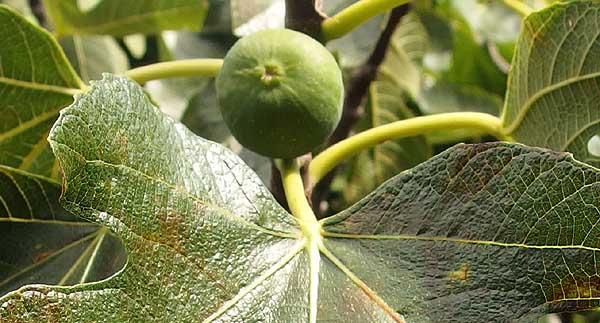
I volunteer at our local master gardener hotline, it’s a way to help others with garden problems and it keeps me on my toes.
Last week a couple came into the office with a problem and my partner discussed a solution with the wife the husband noticed a jar of fig cuttings that my hotline partner had brought in for me. This prompted a different question from him.
I am not getting any figs. Why not?
I explained to him that figs are only produced if the tiny fruit (actually at this point the flower) is pollinated by the fig wasp which has to burrow into the fruit to get to the ‘flower’. If you don’t have fig wasps you don’t have fruit.
Thus if you have a neighbor who is an avid sprayer for all kinds of insects without any real discretion then you are going to kill off the wasps before they get to your figs.
As I talked his head hung lower and lower and at the end he admitted that he was indeed a broadcast sprayer, killing all the insects that he found in his garden. Thus he had no figs.
This is just one example of what can happen if chemicals are used in a arbitrary manner. If you kill all insects because you think they are bad and will damage your plants you kill good insects along with the bad. You might want to kill aphids on your roses and spray everything around you ‘just in case’. If you do that, to begin with you are going to get wind drift. Even of very still days there is usually a bit of breeze which will carry the spray to some other plants. If you absolutely have to spray never do it on a breezy day.
You are also going to kill every other insect that the spray gets near, that means the ones on the ground under the plants, the ones on the neighboring plants the ones that have come in to eat the aphids that you are trying to kill and those that are just looking for a nice rest before they fly or crawl off somewhere else.
Many of these insects are your friends, just like the fig wasp. The ladybugs on your roses or the lacewings are eating the aphids not making more, you kill them then you kill your biological control.

I am not saying that you should never spray. There are certainly times when its necessary, but it should be done carefully on as still a day as possible and as precisely as possible. Spray only the plants that really need it because they are infested. Don’t just spray for the heck of it ‘just in case’. Keep the use of chemicals to a minimum. Your garden will love you a lot more and you will be rewarded.
